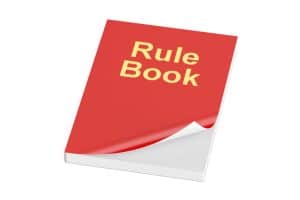Menu
August 9th, 2017
Contributor: Lisa Schmidt, J.D.

Attorney advertising has been something of a field of landmines for a long time. Lawyers across the country step with caution into new ways to represent themselves to potential clients, wary of triggering prohibitions into misrepresentation or direct solicitation. Many are not even entirely sure how their own state's rules apply to their marketing efforts.
What’s the Problem with Legal Advertising Rules?
As more legal advertising has shifted to online venues, the question of what is and is not ethical has gotten even more confusing. Can attorneys blog? Should they respond to questions on legal answer sites like Avvo.com? What about social media? What should their website say about their practice areas or expertise?
In 2015, a report by the Association of Professional Responsibility Lawyers called most states' rules "outdated and unworkable." The APRL said that, the "rapid technology changes compel a realignment of the balance between the professional responsibility rules and the constitutional right of lawyers to communicate with the public." It cited anti-competition concerns, First Amendment issues, and globalization as reasons why traditional advertising just doesn’t cut it when it comes to communicating with modern consumers.
When law firms practice in multiple states or jurisdictions, inconsistent regulations compound the problem even further. Since online materials can be accessed from anywhere, the APRL felt there should be clear model guidance to steer state bar associations in the right direction. A supplemental report in 2016 even questioned whether online or electronic communications could pose the same risks as face-to-face or telephone solicitation.
The two reports touched on the practical challenges facing attorneys and law firm administrators every day. Attorneys and their marketing companies have scrambled for guidance on how to ethically make use of advances in online marketing for years. When a firm’s practice crosses state lines, all their marketing efforts must be reviewed to make sure they follow the new state’s rules. For many firms, the patchwork of legal advertising rules across the country has caused mountains of headaches and lost opportunities.
How the ABA Proposes to Fix the Model Rules
To address this, the ABA Standing Committee on Ethics & Professional Responsibility has presented a comprehensive proposal to rework the model rules on lawyer advertising. The proposal refocused the rules by consolidating them from five rules into two: Rule 7.1 Communications Concerning a Lawyer’s Services, and Rule 7.2 Solicitation of Clients.
Rule 7.1 Recognizes the Public’s Need for Lawyer Communications
The new Rule 7.1 focuses on preventing false and misleading communications. The language of the rule has not changed:
A lawyer shall not make a false or misleading communication about the lawyer or the lawyer's services. A communication is false or misleading if it contains a material misrepresentation of fact or law, or omits a fact necessary to make the statement considered as a whole not materially misleading.
However, new comments seek to clarify the rules and how they could apply to the ever-evolving practice of online advertising. Comment [5] says:
To assist the public in learning about and obtaining legal services, lawyers should be allowed to make known their services not only through reputation but also through organized information campaigns in the form of advertising.
The comments recognize that the public often rely on forms of lawyers’ communications to learn about legal services available to them. Comment [7] says:
Television, the Internet, and other forms of electronic communication are now among the most powerful media for getting information to the public, particularly persons of low and moderate income; prohibiting television, Internet, and other forms of electronic advertising, therefore, would impede the flow of information about legal services to many sectors of the public. Limiting the information that may be advertised has a similar effect and assumes that the bar can accurately forecast the kind of information that the public would regard as relevant.
The proposed changes shift the balance between regulation and distribution of legal information in a way the APRL believes will help the public get the information it needs to make meaningful decisions about their legal representation. This could make it easier for lawyers to create powerful attorney advertising campaigns without having to worry about unclear or overreaching ethical limitations.
Rule 7.2 Opens a Path for Direct Electronic Communications
Every lawyer knows that solicitation of clients is against the rules of professional conduct. There was a time when any effort to recruit new clients was considered distasteful. But as consumers have become more sophisticated, so too have the rules on the issue. Solicitation no longer includes billboards, Internet banner ads, websites, TV commercials, or other communications directed to the public at large. The changes to the rules also clarify that it is not solicitation to respond to requests for information or create automatically generated responses to Internet searches.
But what about direct e-mailers? Are newsletters or email marketing campaigns solicitation? Comment [3] actually encourages them (over face-to-face, in-person, or telephone solicitation). It says:
The use of general advertising and written, recorded or electronic communications to transmit information from lawyers to the public, rather than direct in-person, face-to-face or live telephone communication, will help to assure that the information flows cleanly as well as freely.
The reason is simple: there’s a record of what was said. Remember that Rule 7.1 prohibits false or misleading representations. The problem with solicitation is that it could easily contain that prohibited information. An unsophisticated consumer could easily misunderstand what was said and have a false understanding of the attorney’s offer of services. But because they are written, electronic communications are permanently recorded. This reduces the risk of confusion and allows consumers to compare what they read to other information they may have about the lawyer.
To further clarify the role of electronic lawyer communications, Model Rule 7.2 says:
[E]very … electronic solicitation by or on behalf of a lawyer seeking professional employment from anyone known to be in need of legal services in a particular matter shall include the words ‘Advertising Material’ … at the beginning and ending of any recorded or electronic communication, unless the recipient [is a lawyer, is sophisticated user of legal services, is part of a class action, or has an existing close relationship with the lawyer.]
This protects the public from being misled about the purpose of a given communication, while still giving attorneys the freedom to build their business online.
Will the Model Rules Apply to Your Firm?
Just because the ABA has proposed new lawyer advertising rules it doesn’t mean you need to rewrite all your ad copy or overhaul your web content (though you may want to for other reasons). Even after the March hearing, the proposed rules are not yet in their final form. Lynda Shely, the immediate past president of APRL, called them a "work in progress" and encouraged comments, ideas, and suggestions.
Once the model rules are approved, it may still take some time before any given state adopts their language. Almost every state has adopted the ABA Model Rules of Professional Conduct. But as the rules change it is up to each state whether, and how, it will adopt those changes. Each state adjusts the model rules in its own way to suit the needs of its attorneys and its citizens. How the new model rules will affect your website, blogs, or other online marketing efforts will depend on the final form of the rules in your jurisdiction.
Have more questions about websites, blogging, and style? For new clients, tell us about yourself and your needs. For existing clients, email marketing@themodernfirm.com!
Author Lisa Schmidt is an attorney and freelance writer for law firm websites.
Categories: Question of the Week






